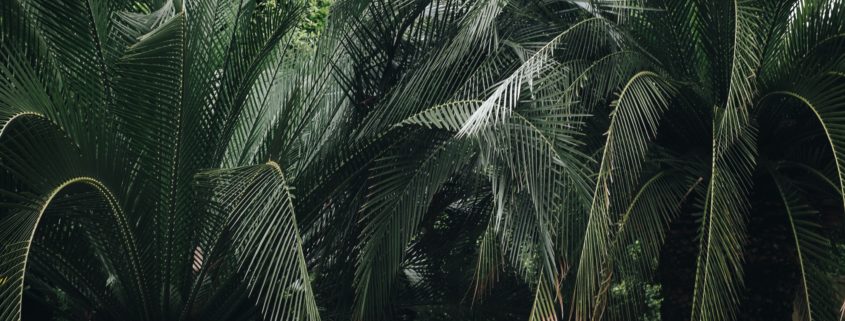Palm oil in cosmetics - What is the problem?
What is palm oil, and where does it come from?
Palm oil is extracted from the fruits of the oil palm. It is about three times as profitable as rapeseed, and requires only a sixth of the acreage of soybeans, with their own yield. Depending on which part of the oil palm palm oil is extracted, it has a different composition. The oil from the fruits has a very high content of oil and palmitic acid. The oil from the cores has a very high content of lauric acid. Palm oil also has an unusually large amount of A vitamins and tocopherol.[1]
Where we use palm oil?
Palm oil is very versatile. It is used in food, where it is used for cooking, frying, baking, as well as for the production of sweets and margarine. It can be found today in almost every second product in German supermarkets. It is also used to make surfactants, especially sodium lauryl sulfate. It is also used in cosmetics, as a bodying agent and as a carrier or active ingredient. It is also used to produce biodiesel. Due to its high yield, it is also very cheap. After soybean oil, it is the world's most widely grown vegetable oil, accounting for almost 30% of market sales.[2]
What are the problems with palm oil?
The cultivation of palm oil is increasing steadily, so there was a 15% increase in 2014, from 57.3 million tonnes in 2014 to 60 million tonnes. [3] Zwischen H?? Auch zwischen zwischen? Auch zwischen? Auch zwischen auch zwischen? Auch zwischen? Auch auch zwischen H zwischen auch? Zwischen zwischen auch zwischen auch? Auch zwischen? Zwischen? Auch?? H? Auch H? H zwischen? Zwischen?? Zwischen? Auch? Zwischen? Zwischen? Zwischen zwischen? Auch zwischen? Auch zwischen? Auch zwischen auch? Zwischen? Zwischen? In the years from 1990 to 2005, 1.87 million hectares were planted in Malaysia, and about 3 million hectares of plantations in Indonesia. [4] The majority of these plantations was created by the clearing of the local rainforests. In addition, it should come on the plantations to unfair working conditions, or even forced labor and child labor. This also includes insufficient protective equipment for the workers resulting in many intoxications and deaths caused by the commonly used herbicide paraquat. According to the scientific magazine "Spektrum" the greenhouse gas emissions are also massively shot up. [5] The finished product can also be caused by so-called process contaminants that foreign substances such as 2-, and 3-MCPD and glycidol remain in it. The IARC classifies glycidol as "possibly carcinogenic," and MCPD as genotoxic. [6] According to EFSA studies, palm oil contains around 3,955 μg / kg of glycidol as an average. Other vegetable oils are between 300 and 15μg / kg. [7] In addition, there are strict ecological and economic guidelines only for cultivation, for use as biodiesel. Cultivation for use as food or consumer goods does not have such regulations. Even eco-seals do not have to say anything. The RSPO is one of the seals of approval, which has sufficient informative value, but is in the criticism of "Save the rainforest e.V" not enough to respond to deforestation and climate change.
Are there alternatives ?
All in all, no. Palm oil is so rich and versatile that there are few alternatives. Coconut oil would come into question as a substitute, but the adequate cultivation of its producer would increase the required acreage by a factor of 5 and increase greenhouse gas emissions by almost 308 million tonnes. [9] In cosmetics, palm oil can be replaced with other fats. Sustainable cosmetics mostly refrain from palm oil, and preferably uses shea butter, cocoa butter and coconut oil. Surfactants can also be made from other materials, and there are several alternatives to those based on palm oil. For the first time, you can not completely eliminate palm oil, or at least its negative aspects on the environment. But a look at the ingredients and a short search for the RSPO seal can give at least some insight for those interested. [10]
Quellen und Infos zum nachlesen :
FAO search engine [3]
NewScientist article on clearing palm oil plantations[4]
Spektrum articles on palm oil and greenhouse gases[5]
Article on MCPD and glycidol[6][7]
Wikipedia[1][2][8][9][10]




Leave a Reply
Want to join the discussion?Feel free to contribute!